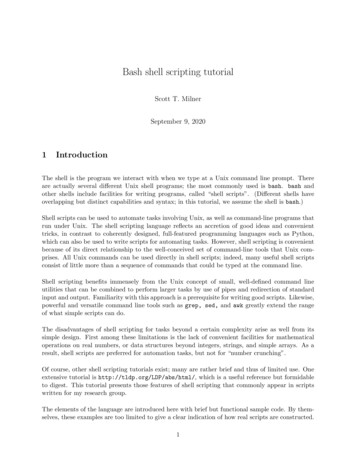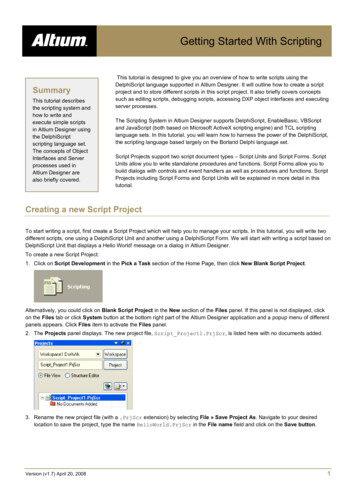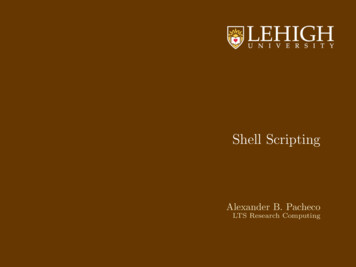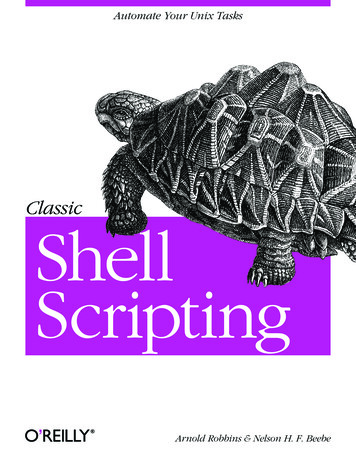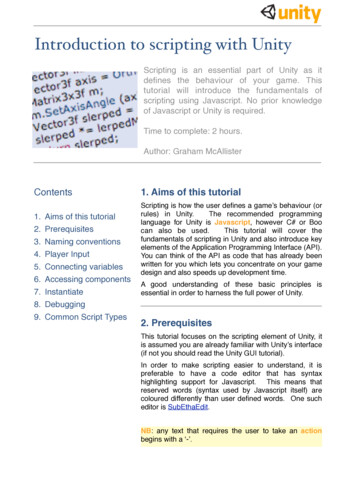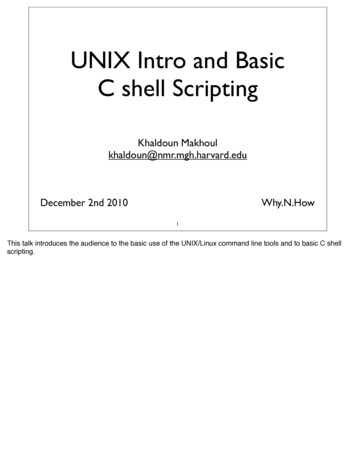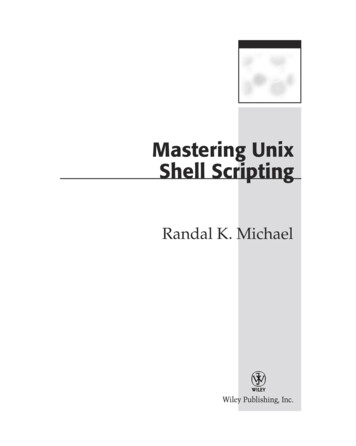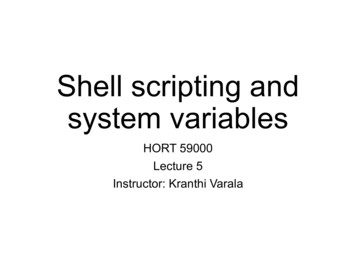
Transcription
Shell scripting andsystem variablesHORT 59000Lecture 5Instructor: Kranthi Varala
Text editors Programs built to assist creation and manipulation oftext files, typically scripts. nano : easy-to-learn, supports syntax highlighting,lacks GUI. Emacs : provides basic editing functions but alsoextendible to add functionality. Supports GUI,extensions provide a wide range of functions. vi/vim : extensive editing functions and relatively limitedextensibility, command and insert modes distinct, steeplearning curve, but very rewarding experience.
Text manipulations Tabular data files can be manipulated at a columnlevel. 1. Cut: Divide file & extract columns. 2. Paste:Combine multiple columns into a single table/file. Sort: Sort lines in a file based on contents of one ormore columns. Regular expressions : defining patterns in text. Specialcharacters and quantifiers allow search andreplacement of simple-to-complex matches. grep and awk use the power of regular expressions tomake text processing very easy.
Command-line operations All commands so far are run one at a time. Redirection and pipes allow combining a fewcommands together into a single pipeline. Lacks logical complexity, such as ability to makedecisions based on input / values in file. Certain repetitive tasks are tedious to user. All commands are being sent to and interpreted by the‘shell’
Client/Server tabase etc.)
Terminology Terminal: Device or Program used to establisha connection to the UNIX server Shell: Program that runs on the server andinterprets the commands from the terminal. Command line: The text-interface you use tointeract with the shell.
Shells Shell itself is a program on the server and canbe one of many varieties1. bash : Most popular shell, default on most Linuxsystems. Installed on all Linux systems2. zsh : A bash-like shell with some extra features.E.g., support for decimals, spelling correction etc.3. tcsh : A C-like syntax for scripting, supportsarguments for aliases etc. We will work with bash shell scripting since it isthe most common and supported shell.
Environment variables A variable is a container that has a definedvalue. It’s called a variable because the valuecontained inside it can change. Variables allow changing a part of thecommand that is to be executed. Every shell has a set of attached variables.See them by using the command env E.g., the variable SHELL contains the path to thecurrent shell.
Working with environment variables Set the value of a variable as follows:FOO BAR Retrieve the value of a variable as follows:echo FOO
Example Environment variables On scholar: using the command env shows 99environment variables: Examples:HOME /home/kvaralaSHELL /bin/bashHOSTNAME scholar-fe01.rcac.purdue.eduHISTSIZE 1000RCAC SCRATCH /scratch/scholar/k/kvarala
Environment vs. Shell variables Environment variables are ‘global’ i.e., sharedby all shells started AFTER variable is defined. Shell variables are only present in the shell inwhich they were defined. Environment variables are inherited by childshells but shell variables are not. Shell variable can be made an environmentvariable by using export command.FOO BARexport FOO
Environment vs. Shell variables export FOO BAR FOO2 BAR2 bash echo FOOBAR echo FOO2(FOO defined in the environment)(FOO2 defined in shell)(Start new shell)(echoes value of FOO)(empty)
Shell Scripting A script is simply a collection of commands thatare intended to run as a group. Commands may or may not be dependent oneach other. Variables, hence their values, can betransferred from one command to another. Supports complex choices and logic. A script is always executed in its own shell.
Example Shell Script First example script: Hello world!#!/bin/bash# This is our first shell script!!echo “Hello World!”
Variables in Shell Scripting Variables are containers that store a value. All variables created in a script are shellvariables. A script can access the environment variablesin addition to its own shell variables. Variable can store any kind of value ie., stringor integer or floating point number etc.
Variables in Shell ScriptingINT 1FLOAT 1.5STR helloSTR2 “hello world”RND asdf2341.sfeecho INTecho “Value of FLOAT is FLOAT”echo “ STR is a string”echo “ RND is non-sensical”
Example Shell Script Second example script: lsScr.sh#!/bin/bash# List contents of scratchcd RCAC SCRATCHls –l Make script executable, place it in PATH.
Special shell variables Special Variables # @ 0 1, 2. ? No. of parameters given to scriptList of parameters given to scriptName of current program (script)Parameter 1, 2 and so on.Exit value of last command run These variables are shell variables and onlyvalid to the current shell.
Even more special characters * matches every character, just as in regularexpressions. So, ls *txt in a script will list all files whosename ends in txt. \ is an escape character which tells the shell tonot interpret the character after it. \ is commonly used to escape the specialcharacters such as *, etc.
Example Shell Script Third example script: lsScr.2.sh#!/bin/bash# List contents of scratchecho “Executing script : \” 0\” with #parameters”cd RCAC SCRATCHls –l Make script executable, place it in PATH.
Command Blocks Two fundamental blocks in scripting: LoopsRepeat the commands in the block until the exitcondition is met. ConditionsEvaluate condition and if true execute commands inthe block.
Loops Two kinds of loops supported in bash: for loopoperates on a list and repeats commands in theblock for each element on the list while looprepeats commands in the block until an exitcondition is met.
for loops for loopoperates on a list and repeats commands inthe block for each element on the listfor x in [ list ];docommandsdone
for loops for loopoperates on a list and repeats commands inthe block for each element on the listfor x in ( ls );doecho “Found file x”done
for loops for loopoperates on a list and repeats commands inthe block for each element on the listfor x in 1 2 3 4 5 6 7 8 9 10;doecho “Value of x is : x”done
while loops while looprepeats commands until exit condition is metwhile condition;doecho “Value of x is : x”done
while loops while looprepeats commands until exit condition is metx 10while [ x –gt 0 ];doecho “Value of x is : x”x x-1done
Shell Scripting Condition blocks test for a condition and if TRUEexecute one block and if FALSE execute another.if [ condition ]thenBlock 1elseBlock 2fi
Shell Scripting Condition blocks test for a condition and if TRUEexecute one block and if FALSE execute another.x 5if [ x –gt 0 ]thenecho “ x is divisible”elseecho “0 is not divisible”fi
breaking loops Break command asks the shell to exit the loopx 10while [ 1 ];doecho “Value of x is : x”x x-1if [ x 0 ]breakdone
Run external commands backticks are a way to send a command to theshell and capture the result. It’s a special character : Eg.,files ls *txt echo files
Functions in shell Scripting Functions separate logical blocks of code. Typically a function contains a piece of codethat is used repeatedly in a script. Code in a function is only executed when afunction is ”called”. We will cover functions in tomorrows labsection.
Environment variables are 'global' i.e., shared by all shells started AFTER variable is defined. Shell variables are only present in the shell in which they were defined. Environment variables are inherited by child shells but shell variables are not. Shell variable can be made an environment variable by using exportcommand. FOO BAR
